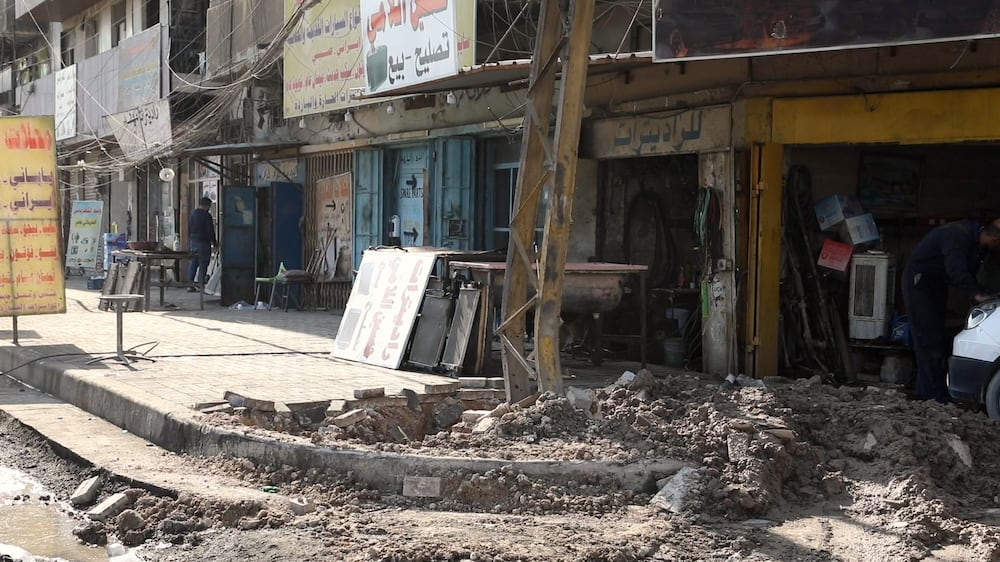US forces on Wednesday killed a commander of an Iran-backed militant group in Iraq that has been attacking US forces in the region, the US Central Command announced.
The suspected drone strike hit a car in Baghdad. Consecutive blasts were heard in the east of the Iraqi capital and a vehicle was seen in flames moments later.
Security sources told The National that two men who were killed in the car were affiliated with Kataib Hezbollah, a powerful Iran-backed militia responsible most of the attacks against US troops in Iraq and Syria.
The strike comes after US forces hit dozens of targets in Iraq and Syria last week in retaliation for an attack on a US base in Jordan that killed three US troops.
While US officials said the initial assessment was one person was killed, and no civilians hurt or killed, two officials with Iran-backed militias in Iraq said that three died, AP reported.
Centcom said the strike had killed “a Kataib Hezbollah commander responsible for directly planning and participating in attacks on US forces in the region”.
“There are no indications of collateral damage or civilian casualties at this time,” Centcom said on X.
An Iraqi security official told The National that the car belonged to the Popular Mobilisation Forces, in reference to the umbrella group of government-sanctioned militias.
“At least two PMF leaders were inside the car,” the official said.
One of the two targets was Wissam Al Saiedi, who was in charge of logistics for the group, according to two police officers.
A Telegram channel linked to Kataib Hezbollah mourned “the engineer of the missiles of the Iraqi resistance”, without directly identifying him.
Iraq’s Security Media Cell denounced the attack as a “clear violation and a breach of Iraqi sovereignty, dragging the region into serious consequences”.
“This new aggression undermines all understandings,” Maj Gen Tahseen Al Khafaji, head of ISMC, said in a statement.
“We hold the American side and the coalition forces responsible for the repercussions of these dangerous acts that threaten the security and safety of the country.”
Iraqi police believe the strike was from a drone.
“A car was on fire in Baghdad's eastern neighbourhood of Al Mashtal,” a police officer told The National. “It was probably hit by a missile fired from a drone. We are investigating.”
Conflict between US forces and Iran-backed militias in Iraq has intensified since the outbreak of the Israel-Gaza war in October.
Mr Al Saiedi was a senior member of Kataib Hezbollah who oversaw missile power and the group operations in Syria.
Like other militia groups, Kataib Hezbollah is part of the PMF.
The Pentagon said the January 28 drone attack against US troops inside Jordan bore the “footprints” of Kataib Hezbollah.
Answer to attacks
A US defence official told The National that Wednesday's strike was not necessarily in direct response to the Jordan attack, but rather as an answer to the scores of attacks against US forces in recent months.
Shortly after the strike, scores of militia members and supporters gathered outside Baghdad’s heavily fortified Green Zone, home to key government offices and foreign embassies, including that of the US.
Security forces have been heavily deployed inside and around the Green Zone, with authorities closing off all entrances, fearing an attack on the US embassy. Only authorised people can enter the Green Zone.
Iraq and Syria have witnessed near-daily retaliatory attacks between hardline Iran-backed armed groups and US forces stationed in the region since the Gaza war began in October.
Iran-backed militias have attacked US forces 168 times in recent months – 100 times in Syria, 67 times in Iraq and once in Jordan, the Pentagon said on Tuesday.
Wednesday's strike comes after Kataib Hezbollah announced it was suspending military operations against US troops in the region, in a move seen to avoid US retaliation.
Thomas Watkins contributed to this report from Washington







